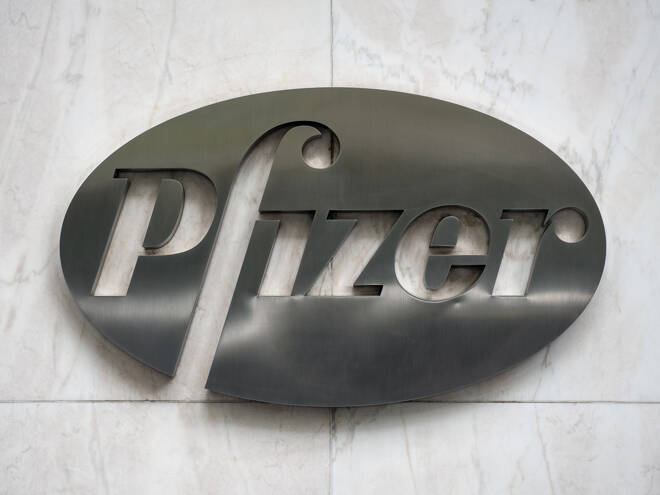Advertisement
Advertisement
Pfizer and BioNTech to Get $1.95 Billion from U.S. Govt for COVID-19 Vaccine Doses
By:
Pfizer Inc and its German partner BioNTech will receive $1.95 billion from the United States government for delivering 100 million doses of a COVID-19 vaccine, sending Pfizer shares up over 5% pre-market.
Pfizer Inc, an American multinational pharmaceutical corporation headquartered in New York City, and its German partner BioNTech will receive $1.95 billion from the United States government for delivering 100 million doses of a COVID-19 vaccine, sending Pfizer shares up over 5% pre-market.
The U.S. government will pay both the companies $1.95 billion upon the receipt of the first 100 million doses, following FDA authorization or approval. The agreement allows them to acquire an additional 500 million doses.
Americans will receive the vaccine for free consistent with U.S. government’s commitment for free access for COVID-19 vaccines, the Department of Health and Human Services and the Department of Defense said.
U.S. Big Pharma Pfizer and German biotech partner BioNTech expect the COVID-19 vaccine to be ready to seek Emergency Use Authorization or some form of regulatory approval as early as October 2020. Both the companies anticipate producing globally up to 100 million doses by the end of 2020 and potentially more than 1.3 billion doses by the end of 2021.
“We don’t know how many competing vaccines will be sold in the U.S. in 2021, but if BNT162 is administered to 100 million people, the two-dose series would yield US revenue of $3.9 billion. To put it in perspective, dividing half of that figure by Pfizer BioPharma global revenues of approximately $43 billion in 2021e implies 4.5% revenue upside. Pfizer also has 50-50 rights ex-US, where volume potential is much greater but pricing likely lower,” said David Risinger equity analyst at Morgan Stanley.
“We look forward to BNT162 and competitors’ Phase 3 data in 2H:20 and evolution of the competitive landscape over time. Regarding US pricing potential beyond the pandemic period, Pfizer has suggested that it could ultimately charge higher prices for a COVID vaccine. We believe long-term pricing would depend upon 1) relative efficacy & safety of Pfizer’s vaccine vs. others, 2) magnitude of competition, and 3) government negotiations.”
Pfizer’s shares jumped over 5% pre-market, while BioNTech’s NASDAQ-listed shares were up over 10%.
Executives’ comments
“We’ve been committed to making the impossible possible by working tirelessly to develop and produce in record time a safe and effective vaccine to help bring an end to this global health crisis,” said Dr Albert Bourla, Pfizer Chairman and CEO.
“We made the early decision to begin clinical work and large-scale manufacturing at our own risk to ensure that product would be available immediately if our clinical trials prove successful and an Emergency Use Authorization is granted. We are honoured to be a part of this effort to provide Americans access to protection from this deadly virus.”
“We are pleased to have signed this important agreement with the U.S. government to supply the initial 100 million doses upon approval as part of our commitment to address the global health threat. This agreement is one of many steps towards providing global access to a safe and efficacious vaccine for COVID-19,” said Ugur Sahin, M.D., CEO and Co-founder of BioNTech.
“We are also in advanced discussions with multiple other government bodies and we hope to announce additional supply agreements soon. Our goal remains to bring a safe and effective COVID-19 vaccine to many people around the world, as quickly as we can.”
Pfizer stock forecast
Fourteen analysts forecast the average price in 12 months at $41.41 with a high forecast of $55.00 and a low forecast of $35.00. The average price target represents a 12.86% increase from the last price of $36.69. From those 14, six analysts rated ‘Buy’, eight rated ‘Hold’ and none rated ‘Sell’, according to Tipranks.
Morgan Stanley target price under a bull scenario is $41 and $27 under the worst-case scenario. We second Morgan Stanley on Pfizer’s stock outlook. We also think it is good to buy at the current level and target $40 as 50-day Moving Average and 100-200-day MACD Oscillator signals a buying opportunity.
Analyst view
“We project solid growth prospects, but we note that Pfizer’s financials and dividend are set to adjust. We project solid single-digit long-term growth. Pipeline execution will be key to investor perception,” said David Risinger equity analyst at Morgan Stanley.
Upside and Downside risks
Upside risks are core business upside, positive pipeline developments, strategic action creates shareholder value, and multiple expands due to improving growth prospects, Morgan Stanley highlighted as upside risks to Pfizer.
Downside risks are financial shortfalls, P/E contracts due to pipeline shortfalls, strategic action is disappointing, litigation problems, and negative US drug pricing developments, Morgan Stanley highlighted as downside risks.
About the Author
Vivek Kumarauthor
Vivek completed his education from the University of Mumbai in Economics and possesses stronghold in writing on stocks, commodities, foreign exchange, and bonds.
Advertisement
